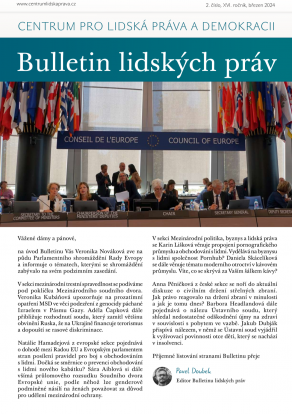You can download the autumn V4 Human Rights Review here.
You have the first issue of the V4 Human Rights Review in front of you. How did this happen?
This year we commemorate 30 years since the four ‘Visegrad countries’, which include the Czech Republic, Hungary, Poland and Slovakia, began their journey to become liberal democracies. Over the years, these central European states established systems based on respect for personal liberties, rule of law and human rights.
Nevertheless, there are numerous threats to the quite new democracies, such as efforts to undermine judicial independence, restrict the rule of law or certain fundamental rights, as well as xenophobia, advance of populism and polarization of the societies. These challenges can only be successfully tackled if people are well-informed about the phenomena.
In our opinion, on the one hand, there are a number of rather superficial articles, both on paper as well as on the internet. On the other hand, there are also well-researched scholarly articles. However, the general public might find those too daunting to read, and thus their insights often go unnoticed outside of academia. Therefore, we decided to launch a joint project in which leading human rights institutes from each V4 country will choose experts to write shorter, easy to read articles on current developments in the areas of human rights and democracy.
We feel that in many ways the V4 countries tend to behave similarly. Thus, we believe that by objectively informing about actual developments, we can contribute to preventing democratic backsliding.
The V4 Human Rights Review will be an online quarterly publication. We wish you enjoyable reading!
Content
- Interview with Eva Hubálková from the European Court of Human Rights:
Systemic problems can be fixed
Czech republic
- ‘Hate crime’ in the Czech Republic: before and now
- Being LGBT+ in the Czech Republic: experience with prejudice, discrimination, and violence
- Children’s debts and state policy: developments of debt collection in the Czech Republic
Hungary
- Minority representation in the Hungarian Parliament
- External citizens and the issue of unequal voting rights in Hungary
- Whittling down academic freedom in Hungary
Poland
- Lowering the retirement age of Supreme Court judges contrary to the European Union law
- Polish Constitutional Tribunal limiting the scope of the prohibition of discrimination
- Polish criminal code amendment: politics v. procedures
Slovakia
- Slovak democracy after the 2018 murder of the journalist, Ján Kuciak
- To watch and to be watched: activities of far-right groups in Slovakia
- Digital surveillance and privacy: battle for telecommunications metadata in Slovakia


